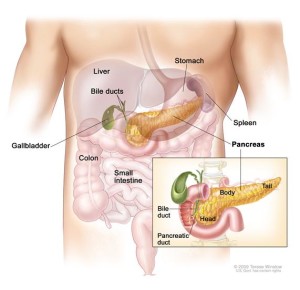Correlation Between Benign prostatitis and psa Levels and Periodontitis
June 18, 2013Billions Worldwide Suffer from Major Tooth Decay
August 13, 2013Recent studies have shown a link between Oral Hygiene and Pancreatic cancer.
We all know flossing is important to keep your mouth healthy. However, recent studies have found a much greater link between oral hygiene and general health. The debris and bacteria that lurk in between the teeth, an area that brushing does not reach, can have a great impact on your general health.
Studies have shown that the inflamed and infected gums cause the bodies inflammatory system to kick in, causing a host of different actions and flooding the blood system with inflammatory hormones. We have seen how there is a relationship between periodontitis and heart disease, erectile dysfunction, prostatitis and other medical problems. Now the scientists see a connection between gum disease and pancreatic cancer.
Pancreatic Cancer
Pancreatic cancer is a very severe one. Almost 1/4 of the deaths from cancer in the US are from pancreatic cancer. It also has a very poor prognosis. Even being discovered at stage 1, there is only a 25% 5 years success rate. while definitive causes for this cancer have not been clearly defined, smoking seems to be a major factor accounting for 30% of these tumors.
Flossing Benefits
Flossing has many benefits. Besides making your gums healthy it also plays a role in preventing bad breath. The American Diabetes association says that gums disease is a causative factor in diabetes and can certainly make the diabetic worse. Bacteria in the
mouth also can affect the respiratory system.
Researchers from the Harvard School of Public Health in Boston surveyed more than 50,000 male health professionals (about half of them dentists) to determine who had periodontal disease, then followed them for 16 years; 216 eventually developed pancreatic cancer. After controlling for known risk factors like smoking, alcohol intake, and body weight, the researchers found that those with gum disease were 64 percent more likely to develop the cancer than those with healthy gums; those who had lost teeth because of severe gum disease had 2.7 times the risk. “Since the cancer is so highly fatal, it’s interesting to have a new risk factor to help us understand the disease better,” says study leader Dominique Michaud.

